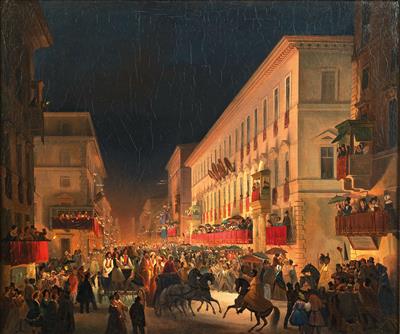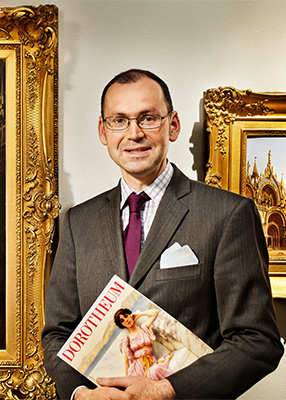Ippolito Caffi

(Belluno 1809–1866 Lissa)
Carnival in Rome, the Feast of Moccoletti, oil on canvas, 63 x 75 cm, framed, (GG)
Provenance:
Acquired directly from the artist in Rome by Pietro Dovizielli (1809-1885), the great-great-grandfather of the current owner;
then by inheritance to the current owner;
Private Collection, Italy.
We are grateful to Annalisa Scarpa for kindly confirming the authenticity on the basis of the original.
This work will be included in the forthcoming catalogue raisonné, which is currently in preparation.
The painter Ippolito Caffi was born in Belluno and moved to Rome in 1835. There he rented an apartment at Via Vittoria 25 from Pietro Dovizielli, the great-great-grandfather of the current owner, from whom the three Caffi paintings offered at auction derive directly by descent.
In this painting, Caffi dives into daily life at the peak of the Roman Carnival, which was an entirely new experience for him. He illustrates its idiosyncrasies without dwelling on minutiae, and recreates the atmosphere and emotions that mark the last day of Carnival.
The scene depicts the feast of Martedi Grasso, when everyone leaves their home wearing a mask and holding a ‘moccolo’ (a small candle, torch or lantern) — a stream of light engulfs the streets, especially Via del Corso. On that occasion, people play a game that consists in extinguishing the light of a person of the opposite sex, whilst keeping one’s own light on; the person whose light is extinguished must take off their mask. Among the crowd, with the protection of masks, anything can happen: cruel jokes, thefts, stabbing, betrayals.
The present painting depicts the carnival scene as it takes place in the middle of Via del Corso, before the Church of San Carlo ai Catinari, with a view towards Piazza del Popolo.
A carriage is discernible at the centre in the foreground. It is drawn by two runaway horses with two gentlemen dressed in Arab style, which suggests dating the present work to the period immediately after Caffi’s journey to the Orient (1843). An inscription to the lower right reads “Michelangelo Tavani fabbricatore di panni”: according to Cracas’ Roman Diary, this shop was active in Rome in 1844 and was located near the Church of San Carlo ai Catinari. This detail suggests a post quem dating of the work to 1844.
Caffi repeated the theme of the Feast of Moccoletti forty-two times, in varying formats. The oldest version was executed in 1837. Among the best known examples are those preserved at Ca’ Pesaro, the Galleria Nazionale d’arte moderna in Rome, and the Thorvaldsen Museum in Copenhagen. The version offered at auction is hitherto unpublished and one of the largest Caffi executed.
Specialist: Gautier Gendebien
 Gautier Gendebien
Gautier Gendebien
+39-334-777 1603
Gautier.Gendebien@dorotheum.it
24.10.2018 - 18:00
- Realized price: **
-
EUR 62,500.-
- Estimate:
-
EUR 50,000.- to EUR 70,000.-
Ippolito Caffi
(Belluno 1809–1866 Lissa)
Carnival in Rome, the Feast of Moccoletti, oil on canvas, 63 x 75 cm, framed, (GG)
Provenance:
Acquired directly from the artist in Rome by Pietro Dovizielli (1809-1885), the great-great-grandfather of the current owner;
then by inheritance to the current owner;
Private Collection, Italy.
We are grateful to Annalisa Scarpa for kindly confirming the authenticity on the basis of the original.
This work will be included in the forthcoming catalogue raisonné, which is currently in preparation.
The painter Ippolito Caffi was born in Belluno and moved to Rome in 1835. There he rented an apartment at Via Vittoria 25 from Pietro Dovizielli, the great-great-grandfather of the current owner, from whom the three Caffi paintings offered at auction derive directly by descent.
In this painting, Caffi dives into daily life at the peak of the Roman Carnival, which was an entirely new experience for him. He illustrates its idiosyncrasies without dwelling on minutiae, and recreates the atmosphere and emotions that mark the last day of Carnival.
The scene depicts the feast of Martedi Grasso, when everyone leaves their home wearing a mask and holding a ‘moccolo’ (a small candle, torch or lantern) — a stream of light engulfs the streets, especially Via del Corso. On that occasion, people play a game that consists in extinguishing the light of a person of the opposite sex, whilst keeping one’s own light on; the person whose light is extinguished must take off their mask. Among the crowd, with the protection of masks, anything can happen: cruel jokes, thefts, stabbing, betrayals.
The present painting depicts the carnival scene as it takes place in the middle of Via del Corso, before the Church of San Carlo ai Catinari, with a view towards Piazza del Popolo.
A carriage is discernible at the centre in the foreground. It is drawn by two runaway horses with two gentlemen dressed in Arab style, which suggests dating the present work to the period immediately after Caffi’s journey to the Orient (1843). An inscription to the lower right reads “Michelangelo Tavani fabbricatore di panni”: according to Cracas’ Roman Diary, this shop was active in Rome in 1844 and was located near the Church of San Carlo ai Catinari. This detail suggests a post quem dating of the work to 1844.
Caffi repeated the theme of the Feast of Moccoletti forty-two times, in varying formats. The oldest version was executed in 1837. Among the best known examples are those preserved at Ca’ Pesaro, the Galleria Nazionale d’arte moderna in Rome, and the Thorvaldsen Museum in Copenhagen. The version offered at auction is hitherto unpublished and one of the largest Caffi executed.
Specialist: Gautier Gendebien
 Gautier Gendebien
Gautier Gendebien
+39-334-777 1603
Gautier.Gendebien@dorotheum.it
|
Buyers hotline
Mon.-Fri.: 10.00am - 5.00pm
kundendienst@dorotheum.at +43 1 515 60 200 |
| Auction: | 19th Century Paintings |
| Auction type: | Saleroom auction |
| Date: | 24.10.2018 - 18:00 |
| Location: | Vienna | Palais Dorotheum |
| Exhibition: | 13.10. - 24.10.2018 |
** Purchase price incl. charges and taxes
It is not possible to turn in online buying orders anymore. The auction is in preparation or has been executed already.
